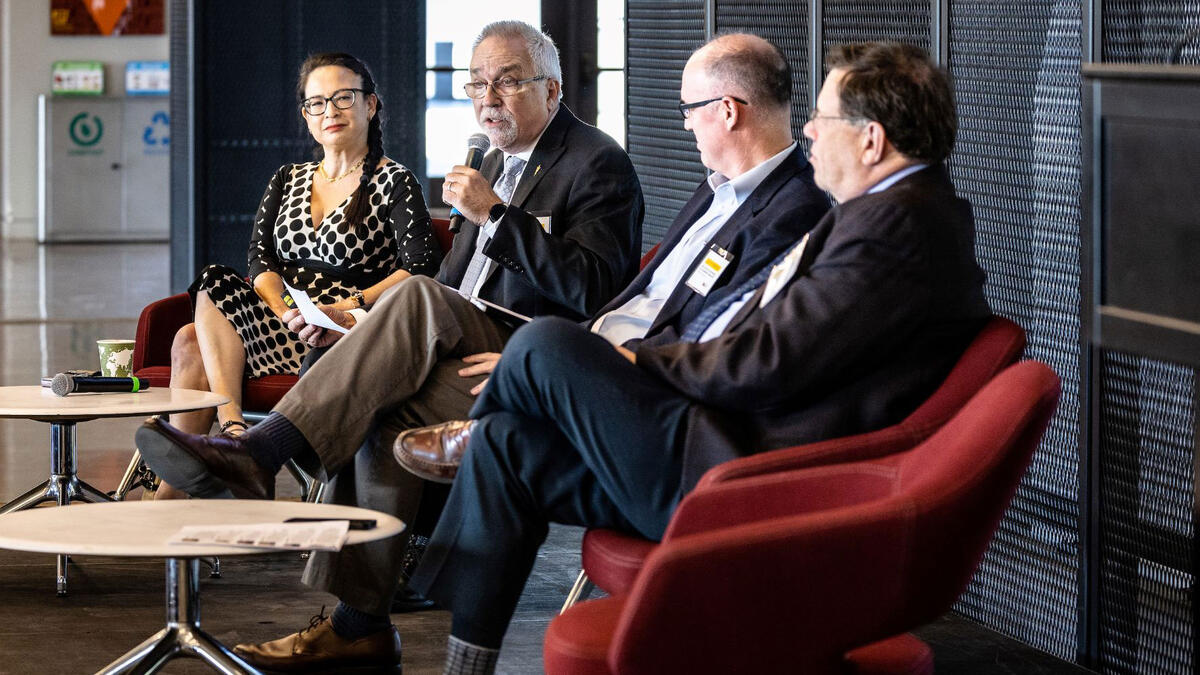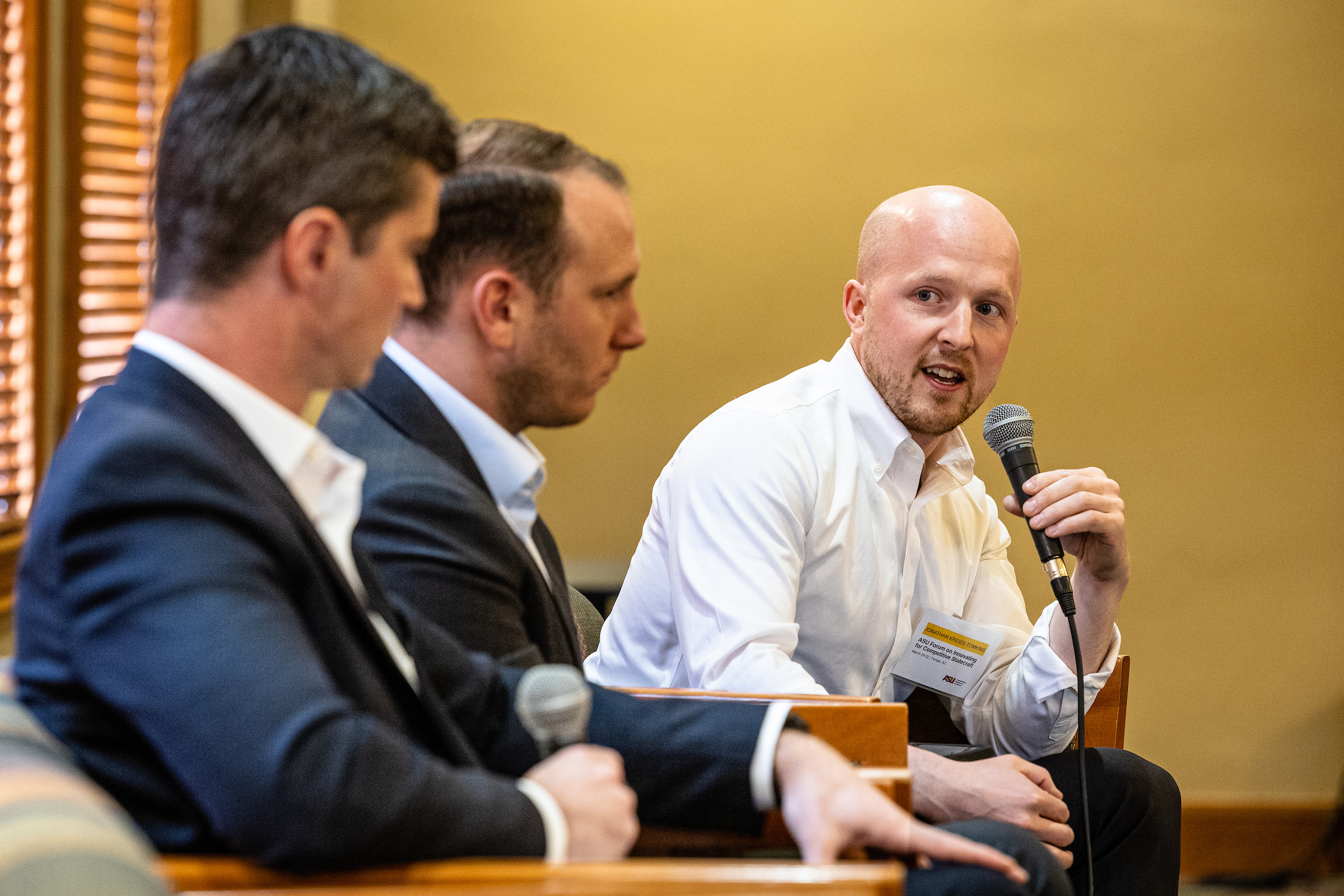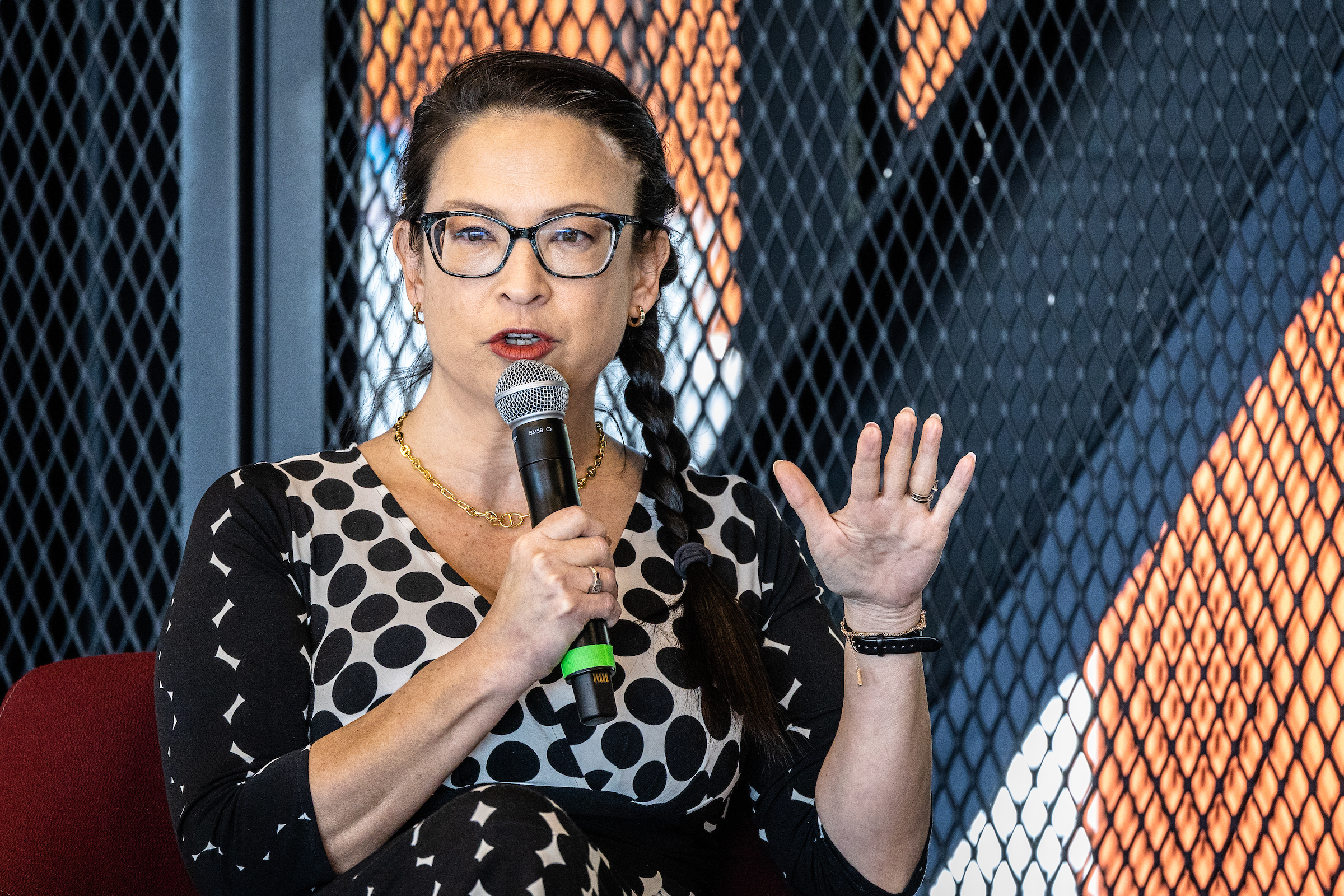ASU draws top diplomats, officials, researchers to forum on competitive statecraft

Arizona State University gathered top diplomats, business leaders and higher education innovators to its campus to brainstorm how the U.S. can regain and sustain its competitive edge in the world.
Titled “ASU Forum on Innovating for Competitive Statecraft,” the conference was held on Thursday and Friday, and was sponsored by ASU's Leadership, Diplomacy and National Security Lab.
More than a dozen talks and panel discussions over the two days addressed everything from the role of international law to the contributions of the humanities to the academic study of nuclear deterrence. Here is a sample of comments:
ASU as a design exemplar
ASU President Michael Crow gave the opening address on Thursday, holding up the reinvention of the university over the past 20 years as an example of how good design can drive massive change.
“Even the military is not as rigid and not as egotistical and not as adoring of tradition as a university,” he said.
After Crow became president 20 years ago, ASU developed a charter and a set of design aspirations to enact the charter, with the goal of changing the culture at ASU as well as boosting the university’s role in serving the community.
“What would the charter be for competitive statecraft?” he asked.
Crow described how ASU changed the engineering program, creating transdisciplinary schools based on problem-solving and increasing the number and diversity of engineering students.
“Your broadness of thinking has got to expand rapidly or we will not be ready. You need to train people in multiple pathways, and every person must be transdisciplinary and capable of thinking that way,” he told the crowd.
ASU President Michael Crow gave the opening address at the ASU Forum on Innovating for Competitive Statecraft on Thursday at Old Main on the Tempe campus. Photo by Charlie Leight/ASU News
'The American Diplomacy Project: A U.S. Diplomatic Service for the 21st Century'
Two former diplomats described how ASU’s Leadership, Diplomacy and National Security Lab helped create a huge project to reimagine the foreign service. Several undergraduate and graduate students helped on the project.
Marc Grossman, former undersecretary of state for political affairs during 9/11: “One challenge is that the State Department is built on the philosophy that ad hoc is fine. It’s ‘However you want to try to do this will work.’ It’s a lot of on-the-job training.
“This idea of creating a more professional and more systematic way forward is extremely important.”
The project produced “Blueprints for a More Modern Diplomatic Service,” which offers several action items to modernize the U.S. State Department by increasing the power and accountability of diplomats. The suggestions include creating a stronger State Department role in interagency foreign policy coordination, increasing the connection of diplomats to regular Americans with more speaking engagements, increasing the diversity of the corps through better recruitment, improving training and education across the career life span and creating a Diplomatic Reserve Corps made of retired foreign service officers and members of the public.
The document includes legislative language and a cost estimate for the proposals.
Michael Polt, ASU ambassador-in-residence and co-founder of the ASU Leadership, Diplomacy and National Security Lab: “Colin Powell said, ‘The essence of leadership is trust.’ The overall change I would foresee from these blueprints is that, by expressing trust in our diplomats from the president of the United States to Congress to the American people, they will exercise a new kind of diplomacy that will draw on all levels of national power to achieve our goals.”
Marc Grossman, former undersecretary of state for political affairs during 9/11 (left) and ASU Ambassador-in-Residence Michael Polt, co-founder of the ASU Leadership, Diplomacy and National Security Lab, described their work to reimagine the foreign service Thursday. Photo by Charlie Leight/ASU News
'Preparing Leaders for Competitive Statecraft: The Public Service Academy'
Since 2015, ASU has been working to train students for potential careers in diplomacy through the Public Service Academy in the Watts College of Public Service and Community Solutions.
Brett Hunt, director of Next Generation Service Initiatives at Volcker Alliance and former executive director of the Public Service Academy, said the idea was to create a parallel academy to the military academies but for people who might run nonprofits or work in state government.
“I tried to map what that equivalent would be for leaders for competitive statecraft. And to be honest, it’s a little more difficult than for the military. We know what a second lieutenant needs to do on day one and can train for those things. We are developing leaders for a broad array of difficult challenges we face, from homelessness in the city of Phoenix to competing on the national and international level with monetary policy.
“Public service is not an intent — ‘We feel good when we serve people.’ It’s a specific skill set. And if the government works well, people will trust the government.”
The academy offers an academic certificate in cross-sector leadership offered to students in any major.
The anchor program of the academy is the Next Generation Service Corps, a leadership-development program in which students are required to have three summer internships, in the private sector, public sector and nonprofit sector.
“Even if you said, ‘I’m going to work for KPMG as an accountant,' we still want you to spend a summer understanding the culture and hierarchy of nonprofits,” he said.
Cindy Parnell, chief of public service for the Watts College of Public Service and Community Solutions, said that with over 400 students in the corps, they work on “mission teams” with community partners to address complex social issues — and have to implement a policy or hold an event at the end of the year.
“We have over 30 mission teams addressing topics such as homelessness, health care and water safety and security,” she said.
This year, more than a dozen other universities will launch Public Service Academies through a partnership with the Volcker Alliance.
Ben Freakley, special advisor to the ASU president for leadership initiatives and co-founder of the ASU Leadership, Diplomacy and National Security Lab: “You have to assess the right talent and develop it. If we’re going to win at competitive statecraft, we have to build talented people.”
From left: Ben Freakley, special advisor to ASU President Michael Crow for leadership initiatives and co-founder of the ASU Leadership, Diplomacy and National Security Lab; Cindy Parnell, chief of public service for the Watts College of Public Service and Community Solutions; and Brett Hunt, director of Next Generation Service Initiatives at the Volcker Alliance and founding director and former executive director of the Public Service Academy, speak at the forum on Thursday. Photo by Charlie Leight/ASU News
'Innovating Locally to Compete Globally'
Kevin McGinnis, ASU managing director for strategic technology initiatives: “One challenge we face is that over the past decade, 90% of the innovative jobs have been in cities. We want to include all of the country. We need to make sure we broaden that."
Ian O’Grady, policy advisor to Gov. Katie Hobbs: “We have to zoom out. Do we have the workforce, working with ASU and partners to staff the fab and the suppliers we need to support them, but also research and development?”
Companies looking to locate here will want to look at social metrics, he said. “Child care will be a huge issue. What’s the eighth-grade reading level?”
Arizona has been setting up trade offices in other countries, including Mexico, Israel and now Taiwan and South Korea.
“We can have President Biden go through a bilateral agreement with Korean companies and that’s exciting, but when it comes to site selection, it’s that hard negotiation and relationship building that takes a long time. Each state has its own flavor of economic development. That’s why we’ve been proactive.
“The administration starts the conversation, and we try to close it.”
Jonathan Kreiss-Tomkins, senior advisor to America Achieves: “We need all 50 states and 300 million Americans participating, and that’s not the case at present. You have the superstar metros on the coasts, and most of the rest of the country, from Alaska to Idaho to Iowa, are mostly on the sidelines.
“In the executive branch, there is urgent interest in state, county and local success, and wanting to see Phoenix metro become one of the preeminent semiconductor centers in the world. Within Congress, there is a catch-up, ‘don’t-leave-out-my-state’ mentality.”
The panel "Innovating Locally to Compete Globally" on Thursday featured (from left) Kevin McGinnis, ASU managing director for strategic technology initiatives; Ian O’Grady, policy advisor to Gov. Katie Hobbs; and Jonathan Kreiss-Tomkins, senior advisor to America Achieves. Photo by Charlie Leight/ASU News
'Information, Mis-, Dis-, and Mal-'
Henry Olsen, Washington Post columnist and Thomas W. Smith Distinguished Scholar-in-Residence at ASU: “How do we deal with our adversaries who are trying to poison our minds to make us not resist their malign intentions? We should recognize that while the methods may be new, the purpose behind this is very old. It’s easier to defend yourself when your entire society is built around war. What about when your society is built around freedom?”
Scott Ruston, director of ASU’s Center on Narrative, Disinformation and Strategic Influence: “Democratic societies derive their sovereignty through the political will of their citizens. Their citizens assert their political will based on the information and beliefs they have about their world, and therefore manipulations of that information and those beliefs arguable are an assault on sovereignty.
“One recommendation is to recognize that disinformation in not primarily a technical problem. It is a human problem. And I would argue that rather than shifting from some term of ‘information security,’ I would argue that what we’re talking about is cognitive security. Humans are squishy, complicated and not consistent, and we need to understand that.
“We have a large amount of research going into detecting the presence, attributing the source and characterizing the intent of disinformation. These are critically important ventures, but we need equal attention on why certain types of disinformation campaigns are socially and politically corrosive.
“And I would argue that a lot of our research is into the supply side — interdicting the supply of disinformation. And I think we need to focus a lot of deep thinking into diminishing side factors.”
Steve Corman, director of ASU’s Center for Strategic Communication, said his center studied the ongoing Chinese propaganda against the U.S.
“Just last year, (Chinese President) Xi Jinping said, ‘The East is rising, and the West is declining.’ This is a theme.
“The No. 1 theme is on democracy, and the Chinese are assiduously working to hollow out the idea of democracy and replace it with something they call ‘democracy with Chinese characteristics.’ Democracy in the United States, according to them, is flawed and chaotic. The Jan. 6 insurrection is a perfect example of this, but it extends to dysfunction in Congress and so forth. Whereas democracy in China is for everybody and it’s effective.
“In terms of security, we’re a violent society. We have school shootings every couple of months and shootings on the streets. That doesn’t happen in China, where everybody is safe.
“The ultimate objective is that the Chinese are trying to portray to the world, especially to their allies in Asia, that they are fit as the new world leader and we no longer are.
“We can’t allow the Chinese to frame the ‘Belt and Road Initiative’ as this benevolent Chinese giveaway to the Third World, and instead we need to phrase that as a way for them to get their hooks into Third World countries and exercise influence there.”
Mi-Ai Parrish, CEO of MAP Strategies, former publisher of The Arizona Republic and professor for media innovation and leadership in the Walter Cronkite School of Journalism and Mass Communication: “Now we have institutionalized some of this disinformation. You’re seeing this with the Dominion lawsuit against Fox News. That’s going to play out deeply in the discussions about statecraft and the nature of media and disinformation and how we deal with those bad actors.
“As journalists, we’re sort of OK with chaos in the information space. We want free speech and we want all of those opinions, but it’s been weaponized and, in some ways, indoctrinated. Fox News is on all the military bases. It’s the standard channel there. That’s being discussed more widely because of all the deliberate near-disinformation that’s going out in traditional media forms.
“I’ve come to a place in my career, and it’s a humble place, where the truth isn’t the defense. It’s part of the defense and part of the explanation, but we’re so completely bonkers, so completely out of any sort of norms, that it is not just the crazy person in the tin hat. These are elected officials, people in positions of tremendous power. We have allowed, through lack of rigor, laziness, confusion, I don’t know, to apply the old rules to a new state of reality where former President Trump lied literally 30,000 documented times and it was like, ‘another falsehood.’ This is not a falsehood. This is a lie.
“And it’s not just the media space. It’s also advertising and marketing. It’s not something journalists can solve.”
Mi-Ai Parrish, CEO of MAP Strategies, former publisher of The Arizona Republic and professor for media innovation and leadership in the Walter Cronkite School of Journalism and Mass Communication, speaks about misinformation at the forum Friday. Photo by Charlie Leight/ASU News
Top image: The ASU Forum on Innovating for Competitive Statecraft featured a panel discussion Friday at the San Tan Ford Club in Sun Devil Stadium on disinformation. Participating in the discussion were (from left) Mi-Ai Parrish, professor for media innovation and leadership in the Walter Cronkite School of Journalism and Mass Communication; Steve Corman, director of ASU’s Center for Strategic Communication; Scott Ruston, director of ASU’s Center on Narrative, Disinformation and Strategic Influence; and Henry Olsen, Washington Post columnist and Thomas W. Smith Distinguished Scholar-in-Residence at ASU. Photo by Charlie Leight/ASU News
More Law, journalism and politics

Veteran journalists Jorge Ramos and Marty Baron talk democracy and free press
Arizona State University hosted "Truth Across Borders," a bilingual panel featuring two of America’s most iconic journalists, last week in the Evelyn Smith Music Theatre on Arizona State University's…
Can elections results be counted quickly yet reliably?
Election results that are released as quickly as the public demands but are reliable enough to earn wide acceptance may not always be possible.At least that's what a bipartisan panel of elections…
Spring break trip to Hawaiʻi provides insight into Indigenous law
A group of Arizona State University law students spent a week in Hawaiʻi for spring break. And while they did take in some of the sites, sounds and tastes of the tropical destination, the trip…






